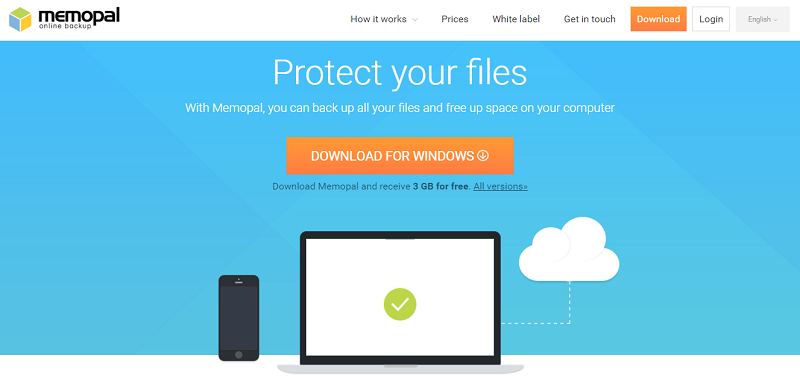Are you a Linux user struggling to find a reliable backup service to protect your computer’s data? Never fear – we’ve got a solution (or five) for you. Whether you’re using Linux for work, for speed and flexibility, or because you’re fed up of Mac and Windows OS, it’s still important to keep your data backed up – and luckily, many of the best and brightest backup services on the market have stepped up to the Linux backup challenge.
To keep things simple for Linux aficionados, we’ve compiled a list of the best Linux backup services available today – so scroll down for a quick list of our picks, or read further for a run-down of their greatest strengths.
Best Linux Backup Services Summary
[top5table CrashPlan IDrive SpiderOak Memopal Dropbox ratings=”5,4.5,4.2,4,3.7″]

Winner
CrashPlan
[vpnbest value=”5″] 5/5
 PROS
PROS- Unlimited storage space
End-to-end encryption
Straightforward Linux backup
Scheduled and automatic backups
 CONS
CONS- Backup from limited devices
CrashPlan is a backup provider of many strengths; covering all of the important bases thanks to strong security, unlimited storage space, user-friendly software, and (of course) a client for Linux as well as Windows and Mac.
CrashPlan is a great choice for Linux users comfortable with using a command line interface (CLI), with a text-based installation package to get things up and running. While this may be a little confusing for inexperienced users, it’s straightforward for anyone with some CLI experience. Once setup, you’ll find integrated options for setting backup schedules and automatic uploads, as well as all of the advantages of end-to-end encryption.
Linux users are subject to all of the same plans and prices as other CrashPlan subscribers, with unlimited storage space for one PC on offer for $4.99 per month, and protection for up to ten devices available for a monthly fee of $12.95.
2nd place
IDrive
[vpnbest value=”4.5″] 4.5/5
 PROS
PROS- Low price
Run using Perl scripts or CLI
File sharing
End-to-end encryption
 CONS
CONS- Price increase in second year
With file sharing, versioning, archiving and NAS backups all available for a low monthly fee, IDrive is an excellent backup solution for users across platforms.
Linux users have two options when it comes to running IDrive; using Perl scripts available in a readme doc that can be downloaded from the IDrive website, or utilising its command line interface. Once setup, you’ll have access to the full range of IDrive processes, as well as giving your data the protection of end-to-end encryption.
With prices starting at just $3.71 per month for 1TB of storage space (increasing to $4.95 /month in your second year), IDrive is a steal for the price, with a loyal customer base built since 1995 happy to attest for its reliability.
To give IDrive a try, just click the link below!
3rd place
SpiderOak
[vpnbest value=”4.2″] 4.2/5
 PROS
PROS- Zero Knowledge security policy
Automatic and scheduled backups
Backup from unlimited devices
 CONS
CONS- Average customer support
Slightly higher price
SpiderOak is one of our favorite backup services here at BestBackups, thanks to some of the strongest security measures around; not to mention a broad range of backup options, secure synchronisation between unlimited devices, and protected file sharing.
There are plenty of advantages for Linux users too, as you won’t find any of SpiderOak’s Zero Knowledge policies compromised at all by running on a different OS – and although the provider recommends that you download their software from your distribution’s package manager, there’s a manual process to get setup too. On top of that, command line integration makes using the software a relatively straightforward process, with access to the full range of backup features.
Although occupying the higher end of the standard backup price range, we think that SpiderOak is worth the investment, with $7 per month getting you 30GB of storage space, 1TB available for $12 /month, and 5TB on offer for a monthly fee of $25. There’s even a 60 day trial on offer too, if you’d like to try before you buy.
If SpiderOak sounds like the solution for you, just follow the link below to check out their website and sign up today!
4th place
Memopal
[vpnbest value=”4″] 4/5
 PROS
PROS- Run with CLI or as service daemon
File sharing
End-to-end encryption
 CONS
CONS- Price is a little high
Italian backup company Memopal offers Linux users two ways to run their software – from the command line, or as a service daemon – also making use of a Web-UI. File navigation is straightforward, and you’ll even be able to access your data from iOS, Android, and Windows Phone device.
For users wanting to register multiple devices, Memopal supports backups from an unlimited number – so you can have files from your Windows tablet, iPhone and Linux PC all kept in the same place at the same time. There are also automatic and scheduled backups available, as well as end-to-end encryption.
You can get 500GB of Memopal storage for $7.25 per month, or make use of their 3GB free trial if you’d like to do a test run first. Sign up today by clicking the button below!
5th place
Dropbox
[vpnbest value=”3.7″] 3.7/5
 PROS
PROS- Easy file sharing
Straightforward to set up
Run from CLI
 CONS
CONS- Limited security
No backup scheduling available
Popular file sharing service Dropbox also has a Linux client available, supported on systems running Ubuntu 10.04 or higher, and Fedora 19 or higher. You can run the desktop app from the Command Line Interface,with a Python script available to implement Dropbox CLI control for any users having problems.
Once you’ve got Dropbox up and running, you can start and stop file transfers, change proxy settings, throttle bandwidth use, and more – including, of course, making use of Dropbox’s quick and easy file sharing features. Unfortunately, you won’t find much by way of security here, as convenience comes at the cost of end-to-end encryption; however, uploads of pre-encrypted files are supported should you want to put in a little time to protect your files beforehand.
Dropbox offers a 2GB free plan should you want to give it a try first, with 1TB also on offer for $11 per month. Follow the link below for more information!
Linux-specific backup services
As well as the providers mentioned above, you’ll also find a host of services built specifically with Linux backup in mind. These include Fwbackups – a free, open source program that’s simple to use and install, Rsync, a command line backup tool, and Bacula; a good choice for enterprise users and anyone else looking for something more complex.
Here at BestBackups, we’ll be the first to admit that we’re not Linux experts (yet!) – so for a detailed rundown of exactly what these services have to offer, check out this excellent list from Tecmint.
Conclusion
Using Linux brings with it a host of extra freedoms and advantages, although it can sometimes be difficult to find software that can be installed and run seamlessly. Fortunately, the providers in our list are all well-equipped to maximise the potential of Linux backups, so that you’ll never have to worry about losing precious data again.
Best Linux Backup Services Summary
[top5table CrashPlan IDrive SpiderOak Memopal Dropbox ratings=”5,4.5,4.2,4,3.7″]










Sadly, Crashplan left us home users alone..
CrashPlan is exiting the home backup business. The vendor they have partnered with, and that they recommend, to take over this business from them, does not support Linux.